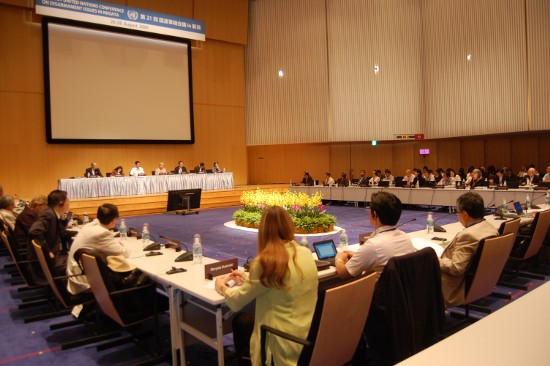Nuclear weapons can be eliminated: Report from Niigata, Part 1
Sep. 4, 2009
Growing momentum in pursuit of "nuclear zero"
by Yumi Kanazaki, Staff Writer
For three days in the city of Niigata, Japan, from August 26-28, participants in the United Nations Conference on Disarmament Issues held lively discussions in anticipation of the Nuclear Non-proliferation Treaty (NPT) Review Conference next May. At the same time, numerous challenges were again recognized. The following three articles will discuss the prospects for the NPT Review Conference through comments made by the participants.
About 90 government officials and experts from 21 nations, including Libran Cabactulan, the Philippines ambassador and president-elect of the next NPT Review Conference, gathered at the Toki Messe, an international conference center located near the mouth of the Shinano River, which flows to the Sea of Japan.
During the discussion on the first day, Susan Burk, special representative of the U.S. President for Nuclear Non-proliferation, stated clearly, “U.S. President Barack Obama said in his speech in Prague that he will pursue ‘a world without nuclear weapons.’ We are prepared to work with our international partners to enhance the international regime by strengthening the NPT.”
The former Bush administration’s stance, which leaned toward unilateralism, has been thought to be the main cause of the breakdown of the previous NPT Review Conference in 2005. Because of that, Ms. Burk’s statement symbolizing “a change” in the nuclear superpower was received as a positive sign for next spring.
However, as soon as the discussions went into further detail, the faces of the participants turned grim. They were reminded of the obstacles standing in the way of the abolition of nuclear weapons.
The ratification of the Comprehensive Test Ban Treaty (CTBT) by the U.S. Senate is one such obstacle. Ms. Burk herself said with some dissatisfaction, “It will be difficult to realize the ratification of the CTBT before the NPT Review Conference.”
Gareth Evans, co-chair of the International Commission on Nuclear Non-proliferation and Disarmament and former Australian Foreign Minister, stressed, “For substantial reductions of nuclear warheads, it is hugely important that this be accompanied by universal acceptance of a doctrine that the sole purpose of such weapons as do continue to exist should be to deter the use of such weapons against a State or its allies.” He made this remark with the pledge of no-first-use of nuclear weapons in mind. But he also revealed his uncertainty about the implementation of the proposal, saying, “Reaching an international consensus on a policy of reducing the role of nuclear weapons is a significant challenge.”
“The courage to leave the nuclear umbrella will contribute to nuclear abolition,” said Kate Dewes from New Zealand, a member of the Secretary General’s Advisory Board on Disarmament Matters. She made this reference with a glance to such U.S. allies as Japan and South Korea, which have become dependent on the nuclear umbrella.
How will the stance of the A-bombed nation of Japan “change” with the election of a new government? The participants at the conference in Niigata will be turning their gaze toward the new administration in Japan, too.
(Originally published on September 3, 2009)
Related articles
U.N. Conference on Disarmament Issues closes in Niigata, Japan (Aug. 31, 2009)
President-elect of 2010 NPT Review Conference expresses optimism (Aug. 28, 2009)
Prospects of NPT discussed on second day of U.N. Conference on Disarmament Issues (Aug. 28, 2009)








